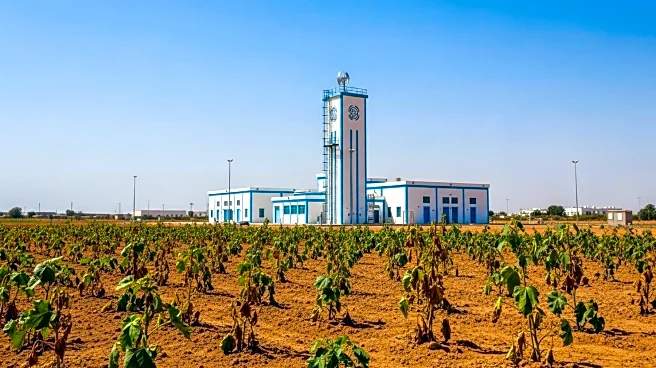What's Happening?
Morocco is facing a severe drought that has persisted for seven years, significantly affecting its agricultural sector. In response, the country is increasingly relying on desalination technology to provide water for agriculture and drinking purposes. Desalination involves filtering seawater to remove salt, and Morocco has established a coastal plant to support this initiative. This technology, traditionally used in the Persian Gulf, is now being adopted by Morocco as a means to sustain its agricultural activities and preserve its way of life. The government plans to expand desalination efforts, with future projects aimed at increasing water supply for both agriculture and urban areas.
Why It's Important?
The adoption of desalination technology in Morocco is crucial as it addresses the urgent need for water in a country heavily reliant on agriculture. This move could help mitigate the impacts of climate change and water scarcity, ensuring food security and economic stability. However, desalination is energy-intensive and can lead to environmental concerns, such as brine discharge and increased greenhouse gas emissions. The success of Morocco's desalination projects could serve as a model for other water-scarce regions, highlighting the balance between technological solutions and environmental sustainability.
What's Next?
Morocco plans to continue expanding its desalination infrastructure, with several large-scale plants expected to be operational by 2031. These efforts will increase the availability of desalinated water for agriculture and urban consumption. The government is also exploring renewable energy sources to power these plants, aiming to reduce the environmental impact. As desalination becomes more prevalent, Morocco may face challenges in managing costs and ensuring equitable access to water resources across different sectors.
Beyond the Headlines
Desalination in Morocco raises ethical and economic questions about resource allocation and the sustainability of large-scale agriculture. The reliance on desalination could lead to disparities between large agribusinesses and smaller farms, potentially exacerbating social inequalities. Additionally, the environmental impact of desalination, including energy consumption and brine disposal, requires careful consideration to avoid long-term ecological damage.











